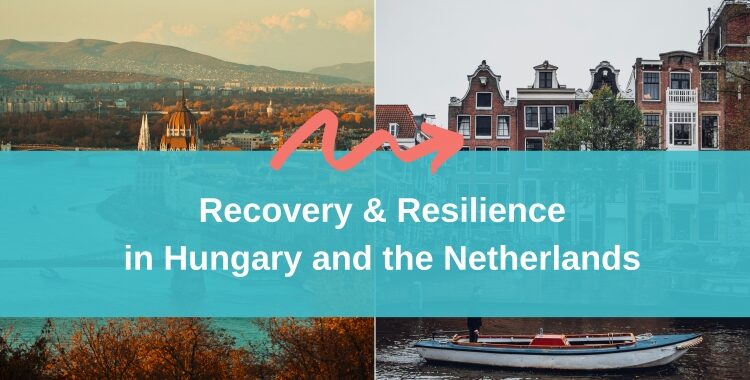As a follow-up to our comparative analysis of the Impact of the Recovery Plans on the social and affordable housing sector, 2 new country profiles are published each month. Now it is the turn of Hungary and the Netherlands, whose Plans were approved slightly later than the others. Let’s see the highlights of these Plans below:
Hungary
Hungary benefits from € 6,512 billion in grant support and €3.918 billion in loans from the RRF.
Overall, the very much simplified national Recovery plan[1] consists of nine components, such as demographics, education, green policies, circular economy, and digitalization. The seven Operational Programmes that implement Structural Funds are in close line with these priorities.
Economically, the main focus is on improving the competitiveness of SMEs, the quality and accessibility of education, and innovation. These, the plan says, are essential to put the country back on the path of economic growth.
An important consideration of the European Commission highlights that without focusing EU subsidies on more comprehensive structural reforms instead of project-based investments, the beneficial effects of the Recovery Plan will remain temporary.
Overall, it seems like governmental strategies and stricter EU criteria are both pushing Hungary to use European subsidies with a different approach focusing on research, innovation & education instead of expensive infrastructural projects.
Relevant parts
Relevant components focus mainly on the RES to make the heating sector cleaner, but they also have some renovation elements (change of windows without isolation and interventions to avoid severe housing quality problems such as leaking roofs and insecure housing conditions).
- Social energy community under the settlements’ component C (€18,8 million)
- Individual solar panels under the energy component F (€402 million)
Homes in 300 settlements will be built or renovated (€13,4 million)
Residential buildings are responsible for one-third of total energy consumption in Hungary. Under the Cohesion funds’ Environmental and Energy Efficiency Operational Program Plus (EEEOP +)[2], support to improve building renovation is planned for about 32000 homes in 7 years, less than 1% of total flats in Hungary. Renovation of social housing is foreseen for only 300 settlements in the National recovery plan.[3]
Community renewable energy projects
Another investment relevant to housing is the installation of community renewable energy (RE) projects (solar panels) to provide electrified heating solutions (with prepayment meters and an amount of “free” electricity financed from the RE production) for families with children, at least in one room/house.
RepowerEU
Hungary’s plan includes 13 reforms and 16 investments to reduce its reliance on fossil fuels. The REPowerEU chapter (in total €4.6 billion) includes measures that will mainly modernise the electricity sector. Related reforms to the housing sector include strengthening the role of energy communities and aggregators, incentivising the uptake of electricity storage and increasing the number of consumers to use smart meters.[4]
Netherlands
The Dutch Economic Recovery Plan has a total budget of €5.4 billion in grants, and it did not include a request for REPower EU pre-financing. The Plan has been structured with a comprehensive approach to tackle key challenges in the housing market and to make the built environment more sustainable.
Key Priorities
Priority 3 of the Dutch Recovery Plan, which focuses on improving the housing market and enhancing the sustainability of the built environment, is organized into two main components:
- Improving the Housing Market
- Making the Built Environment More Sustainable
Key Reforms include:
- Abolition of the Empty Value Ratio: This reform ensures that rental income from private investors’ properties is taxed more fairly, reflecting actual market values.
- Abolition of the Extended Donation Exemption for Owner-Occupied Homes: This measure aims to reduce housing market inequality by removing a gift tax exemption that primarily benefited wealthier households.
- Management of the Housing Supply: The Dutch government has set performance agreements with provinces to construct 900,000 new homes by 2030, focusing on affordable housing to meet the demands of various groups, including the elderly and status holders.
- Tightening Income-Related Higher Rent Increases: Landlords are now allowed to apply higher rent increases based on tenants’ income, ensuring that rental prices are more closely aligned with household incomes.
Key Investments include:
- Housing Construction Impulse: This investment accelerates the construction of affordable homes by providing municipalities with financial support for housing projects that include a significant percentage of affordable housing.
- Subsidy Scheme for Sustainable Social Real Estate: This scheme provides financial support to make social real estate more energy-efficient, including measures like insulation, heat pumps, and energy-efficient lighting.
- Investment Subsidy for Sustainable Energy and Energy Saving (ISDE): A €288 million investment to promote the installation of hybrid heat pumps, which significantly reduce CO2 emissions compared to traditional heating methods.
Please download the country profiles for more details.
